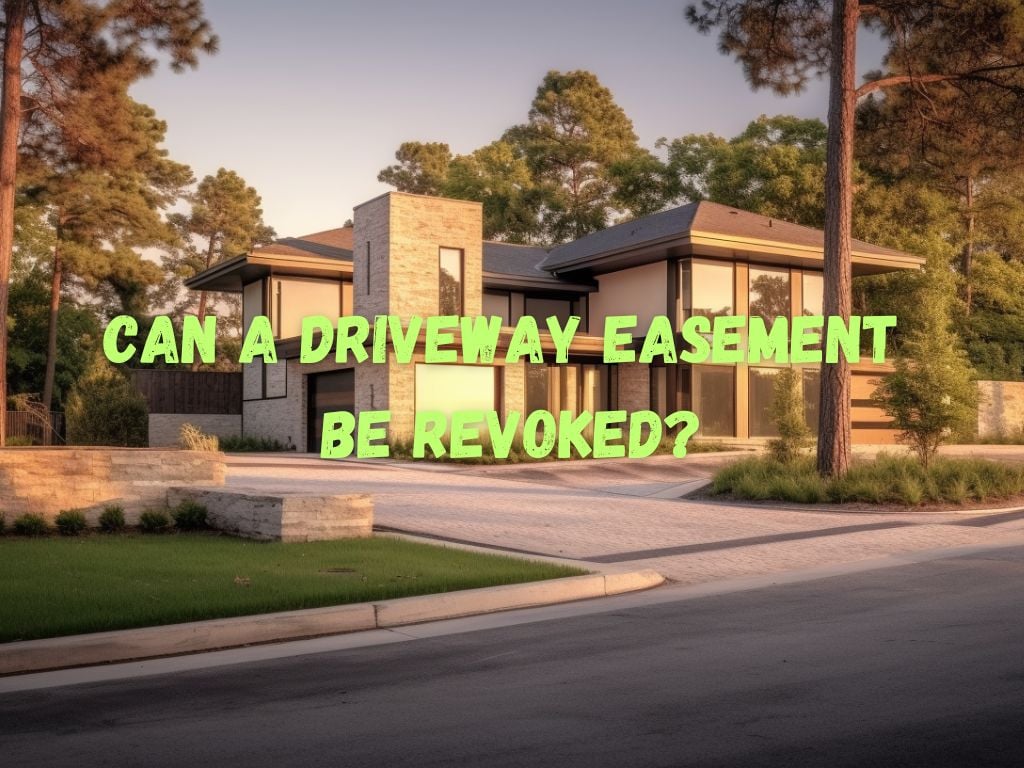Driveway easements play a crucial role in allowing property owners to access their land.
However, there may be situations where one party wishes to revoke or terminate the easement.
So, can a driveway easement be revoked?
In this article, we will explore the complexities of revoking a driveway easement, understanding the legal framework surrounding it, and alternatives to revocation.
Understanding Driveway Easements
Before delving into the revocation process, it is essential to have a clear understanding of driveway easements.
A driveway easement is a legally binding agreement that grants one party the right to use a specific portion of another party’s property for access purposes.
The easement ensures that the dominant estate (the property benefiting from the easement) can have unimpeded passage to and from their land, while the servient estate (the property burdened by the easement) must respect and uphold this right.
Driveway easements can be categorized into two types: express and implied. Express easements are created through a written agreement, typically included in property titles or deeds.
On the other hand, implied easements arise from circumstances or actions that imply the existence of an easement, even if not explicitly granted in writing.

Can a driveway easement be revoked?
A driveway easement can potentially be revoked if the easement agreement allows for it and certain legal processes are followed.
Typically, an easement can only be revoked or terminated if the easement agreement specifies conditions for revocation and all affected property owners agree to the revocation.
The owner of the property burdened by the easement would need to initiate legal proceedings in court to revoke it.
If the court finds that revoking the easement unfairly harms the owners of the dominant estate who benefit from the easement, it may not be revoked.
Grounds for Revoking a Driveway Easement
Revoking a driveway easement is a complex legal process that requires valid grounds and adherence to specific procedures.
While laws and regulations may vary depending on the jurisdiction, common reasons for revocation include:
Mutual Agreement
In some cases, all parties involved may agree to terminate the easement, leading to its revocation. This requires obtaining consent from all parties to ensure that the agreement is legally binding.
However, obtaining unanimous agreement can be challenging, as conflicts and disputes may arise between the dominant and servient estates.
Abandonment
Abandonment is another ground for revoking a driveway easement. If the dominant estate has not used the easement for an extended period, the servient estate may argue for abandonment.
However, each jurisdiction has its own definition of abandonment and rules regarding its application. It is important to consult local laws or seek legal advice to determine the specific requirements in your area.
Changed Circumstances
Revocation can also be sought due to changed circumstances that make the easement unnecessary or impractical.
For instance, if the dominant estate has acquired an alternative access route or if the servient estate has implemented significant changes that make the easement undesirable.
Changes in land use, property ownership, or infrastructure development may warrant revocation. However, it is essential to consult local regulations and obtain legal advice before proceeding.

Legal Considerations and Processes
When contemplating revocation, it is crucial to understand the legal considerations and processes involved.
Revoking a driveway easement usually requires thorough knowledge of property laws and adherence to specific procedures.
The exact steps may vary depending on the jurisdiction, but generally, the following guidelines apply:
Consult with Legal Professionals
Seeking advice from real estate attorneys well-versed in property laws and easement revocation processes is highly recommended.
They can provide guidance tailored to your specific circumstances, ensuring that all legal obligations are met.
A qualified attorney can help you understand the legal ramifications of revoking the easement and provide insights into the potential consequences.
Notification of Affected Parties
Before proceeding with revocation, it is crucial to inform all parties involved, including the dominant and servient estates, about the intent to revoke the easement.
This should be done through written notice, outlining the reasons for revocation and any subsequent arrangements or negotiations.
Providing clear and concise communication can help establish the basis for discussions and potentially lead to resolution without resorting to litigation.
Obtaining Consent
In cases where all parties involved agree to the revocation, it is important to obtain written consent or enter into a mutual termination agreement.
This agreement should be legally binding and duly notarized to avoid future disputes.
If consent is not obtained from all parties, the revocation process may require court intervention through a lawsuit. It is crucial to consult your attorney to understand the specific legal requirements in your jurisdiction.
Court Intervention
If the parties cannot reach a consensus, the dominant estate may seek court intervention.
This often involves filing a lawsuit to have the easement revoked. Litigation can be a lengthy and expensive process, requiring legal representation and the presentation of compelling evidence.
Alternatives to Revoking a Driveway Easement
While revoking a driveway easement may seem like the only solution in certain circumstances, it is important to consider alternatives.
These alternatives may help mitigate conflicts and maintain a positive relationship between the involved parties. Some viable options include:
Mediation and Negotiation
Engaging in open and honest communication with the servient estate to explore potential compromises or modifications to the easement terms is crucial.
Mediation can be a valuable tool in resolving disputes and finding mutually agreeable solutions.
A neutral third party, such as a mediator or arbitrator, can facilitate the discussion and help the parties find common ground.
Modification of Easement Terms
Instead of revoking the easement entirely, it may be possible to modify the terms of the easement to address the concerns of both parties.
This may involve adjusting the access location, limiting the scope of the easement, or establishing additional obligations for both parties to ensure fair usage and maintenance.
Seeking Professional Advice
Consulting with mediators or real estate attorneys can provide invaluable guidance throughout the revocation process.
These professionals can objectively assess the situation, offer alternative solutions, and help negotiate fair terms.
They can also ensure that any modifications or new agreements comply with local property laws and regulations.

Frequently Asked Questions
Can a driveway easement be revoked unilaterally?
Generally, a driveway easement cannot be revoked unilaterally. Revocation usually requires the consent of all parties involved or a court ruling, depending on the circumstances and jurisdiction.
What are the common reasons for revoking a driveway easement?
Common reasons include mutual agreement, abandonment, or changed circumstances that make the easement impractical or unnecessary.
Can a driveway easement be transferred to another property?
In some cases, a driveway easement may be transferred to a different property if all parties involved agree. Transferring an easement often requires legal documentation and proper recording with the relevant authorities.
Are there any instances where a driveway easement cannot be revoked?
Some jurisdictions have legal restrictions on revoking easements, such as those created by necessity or established for public utilities. Local laws and regulations should be consulted to determine any limitations on revoking specific easements.
Can an easement be revoked if it hasn’t been used for a long time?
In some jurisdictions, lack of use may be considered as grounds for revocation, known as abandonment.
However, specific requirements and timeframes for establishing abandonment vary by jurisdiction. Legal advice should be sought to determine the applicability of abandonment in your situation.
Conclusion
Revoking a driveway easement is a complex legal process that requires valid grounds, adherence to specific procedures, and often involves negotiation and mediation.
Understanding the legal framework and exploring alternatives to revocation can help parties find effective solutions that maintain positive relationships.
It is crucial to seek professional advice from attorneys familiar with property laws to navigate the revocation process successfully.
Remember, communication, cooperation, and a willingness to explore compromises can often yield mutually favorable outcomes.


 Tags:
Tags:










